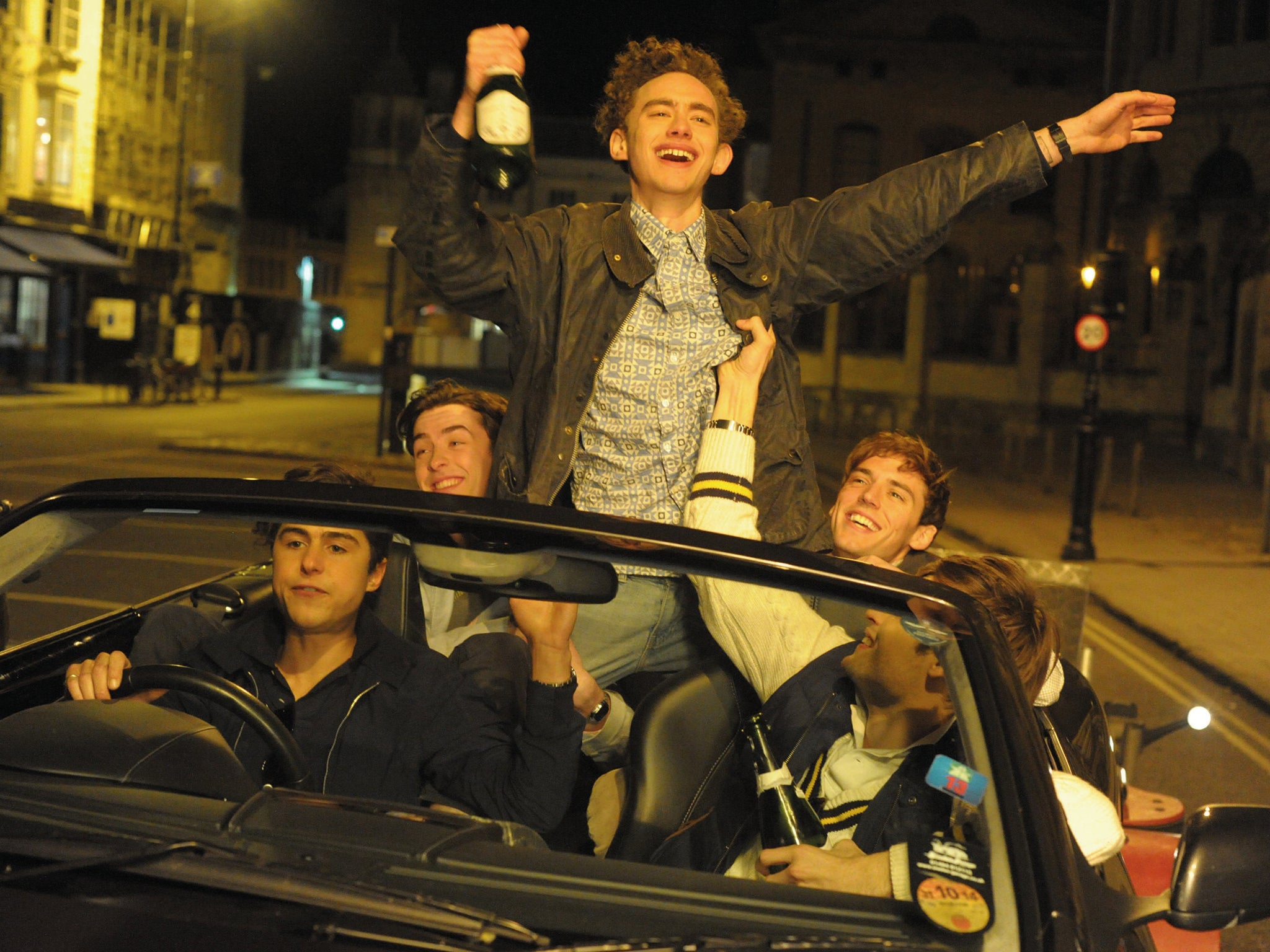The Riot Club film: Why this portrayal of drunken Oxford University toffs is a load of tosh
Scherfig’s Oxford feels as authentic as Woody Allen’s London – ie not at all

Here it comes again.
It is rare that a week goes by without a reminder of that picture of David Cameron and Boris Johnson posing, pompous as peacocks, in their custom-made tailcoats (£3,500 from Ede and Ravenscroft) for the Bullingdon Club photo. Quite right, you might say. As reminders that the UK is currently governed by an elite band of old chums go, they don’t come much more striking.
The producers of The Riot Club know how powerful that picture is, how it sums up in grainy monochrome a whole complex mish-mash of class, politics and privilege. That’s why they have recreated it so faithfully in the publicity material for their new film. There they are, the anointed members of a lightly fictionalised Oxford University drinking society, lined up like entitled penguins outside the country pub they will trash after dinner. A whole scene is dedicated to the taking of the picture; at the last minute, the legend at the back pops on a pair of sunglasses – just like the legend who once stood behind Cameron.
Lone Scherfig’s film is based on Laura Wade’s play Posh (a far better, more incendiary title, for a far better, more incendiary piece), which opened in 2010. I remember going to see it at the Royal Court on the night after the General Election, when the question of who would take power still swung tantalisingly in the balance. Then, it captured an air of farce and uneasy anger. There were catcalls and groans in the topical bits – it was like being at a grown-up pantomime, or Prime Minister’s Questions.
The righteous ire of Wade’s script, combined with the enjoyable, reverse-snob comedy of watching a group of posh boys getting “absolutely château-ed”, calling each other “mate” and “legend” and giving hip-hop the barber’s-shop treatment, made Posh a hit. It transferred to the West End, where its broad brushstrokes worked arguably even better.
But panto doesn’t work on the big screen. The photogenic young cast – some, like Max Irons and Freddie Fox, as well-connected as their characters – are excellent but the joke is somehow not as funny. The class divisions look laboured. New recruit Miles has been given a Northern girlfriend, or “boot-strappy regional” as one of his “mates” puts it, with whom he has tender, post-coital chats about whether one should say “loo” or “toilet”, “napkin” or “serviette”. The pub landlord is a forelock-tugging, mercenary fellow who is seduced, not repelled by this bunch of plummy twerps.
The widening out of the drama from a single pub dining room, for cinematic purposes, weakens its power. Instead of giggling at the boys’ banter, we watch a scarcely credible scene in which they career down Broad Street in an Aston Martin swigging champagne, vomiting over its dashboard and abandoning it outside a charity shop: “ashtray was full anyway”. In another scene, our bewildered freshers walk past a gaggle of braying students all dressed in Marie Antoinette periwigs, apart from one who is dressed as a fox in a velvet smoking jacket. In a pub scene, a group of rowers suddenly remove their tops as one and begin to jeer.
I never remember seeing anything like this – apart from the topless rowers, they got everywhere – when I was a student at Oxford but perhaps I was in with the wrong crowd. I do remember someone asking me at Freshers’ Dinner whether we “got Channel Five up North?” (this was in 1999); I remember a lot of chat about gap years in Zimbabwe. But no one ever complained about the wine being “plonk” or worried about napkin vs serviette. I’d never heard of the Bullingdon, never met a “Buller”. If anything, the poshos you sometimes saw strolling down Cornmarket at 10am in white tie were the odd ones. Drinking societies existed, but they were a bit of a joke. Most of the public schoolboys I came across spent their time pretending not to be posh and trying to MC at Oxford’s premier UK-garage night, Code Red.
The Oxford of The Riot Club, and of the Bullingdon – that “truly shameful vignette of almost superhuman undergraduate arrogance, toffishness and twittishness” as Johnson put it – is for most modern undergraduates a distant, faintly annoying myth. As a result, Scherfig’s Oxford feels as authentic as Woody Allen’s London – ie not at all. Then again, perhaps we ought to be grateful for that.
READ MORE: The Riot Club film: Tories need not worry about this adaptation of Bullingdon Club
Join our commenting forum
Join thought-provoking conversations, follow other Independent readers and see their replies
Comments
Bookmark popover
Removed from bookmarks